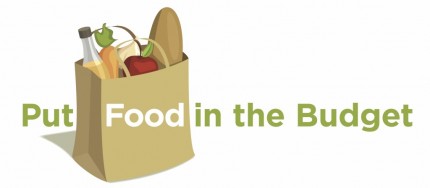Put Food in the Budget
Posted: September 28, 2011
Categories: Food in the News / Vote ON Food and Farming 2011
by Mike Balkwill,
Co-ordinator, Put Food in the Budget campaign
The video of Jack Layton at his funeral shows him when he was a Toronto city councilor saying that it is unacceptable that people in Toronto don’t have enough food. It was unacceptable then and it is still unacceptable now.
We have a perfectly acceptable food distribution system – as long as you have the income to access it. People with low incomes – people who receive a form of social assistance, or people who work at part-time and low wage jobs – can’t access that system.  I remember early in my social work education someone telling me that the problem with our economic system is not ‘production’, the problem is distribution. This person was saying the economy can manufacture large amounts of product – but to be ‘distributed’ people had to be able to afford to purchase it. The North American agricultural economy produces more than enough food to feed everyone – but people are hungry if they don’t have enough money to buy it in stores.
That is why the Put Food in the Budget www.putfoodinthebudget.ca campaign has been calling for an immediate $100 a month increase for every adult in Ontario receiving social assistance. This is a first step towards incomes that guarantee access to food, housing and a life of health and dignity.
The Harris and now the McGuinty governments have adopted a policy of letting the voluntary and non-profit sector create a parallel food distribution system for people with low incomes. This parallel system is inefficient, and for users, often humiliating.
It is also an unsustainable system – dependent on the contribution of thousands of volunteers. The answer is NOT a better system of food banks and emergency meal programmes. The answer is people need incomes that enable them to participate in the food distribution system that we have.
Now I know the current food distribution system has some other problems – like being supplied by large corporate agribusinesses, trucking in food from across the continent and being vulnerable to e coli and other contaminations. The movement for local food security is important and will become even more important as peak oil raises fuel costs for trucking companies and as climate change impacts disrupt food production.
So let’s not build a better food bank system – let’s agitate in this election for social and economic policies that focus on ending poverty caused by inadequate incomes, the high cost of housing and the lack of full-time work with decent wages. These are the reasons most people do not have enough money for food.
Original article here. Learn how to voteONfood.

